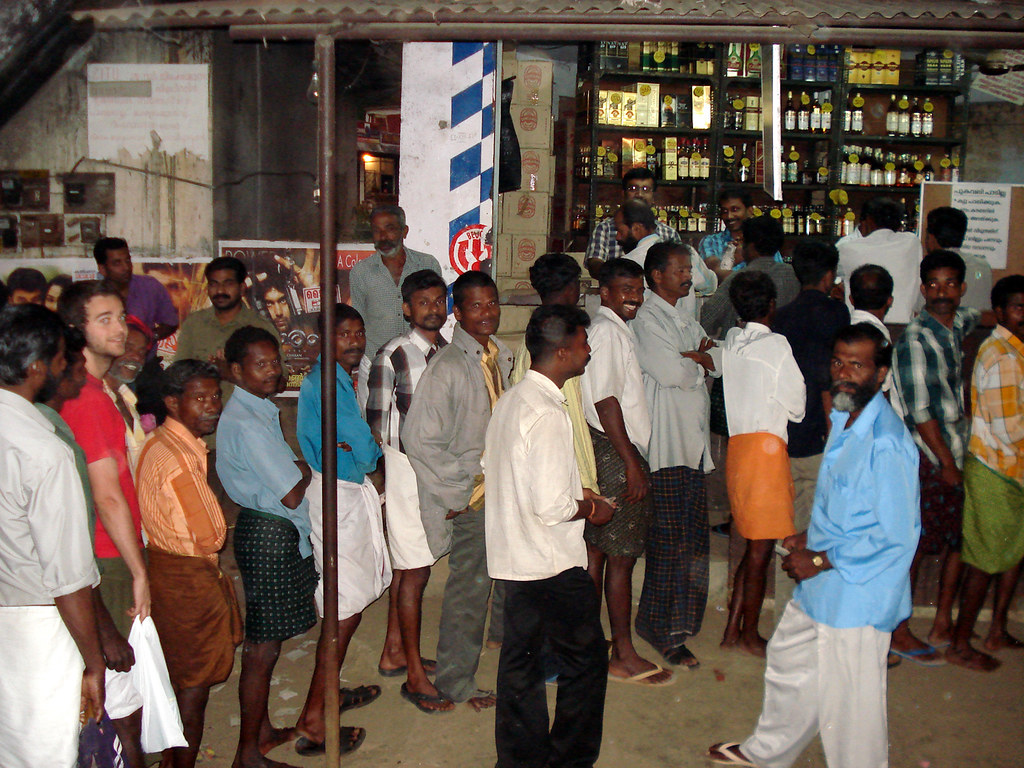New Delhi: It is no exaggeration that one in every three Malayalis is a devotee of Bacchus, the reigning deity of wine. So it was quite natural for the Left Front government in Kerala to keep the supply chain of liquor intact even as it launched a massive effort to break the coronavirus chain in the state. Thousands queued up in front of liquor vends, a monopoly of the state, even as hundreds of fellow denizens struggled to ward off the deadly virus brought home by fellow Malayalis from far and wide. The state government turned a blind eye to this social un-distancing as liquor is the goose that lays the golden eggs. Going by the latest statistics, the total annual turnover of liquor sales in Kerala during 2018-19 touched an all-time high of Rs 14,508 cr and the revenue of the government from state excise during the period was Rs 2,521 cr. Even after the Prime Minister declared a nationwide lockdown, Kerala kept its liquor shops open; though as a grace of concession to the opposition, which was clamouring for a temporary ban on liquor, it shut down all 598 bars and 357 beer parlours. But with the National Disaster Management Act in place, the state government had no other option but to comply with the Centre’s instructions and close down over 300 retail liquor outlets across the state from 26 March. According to reports, the state police and the excise department too had informed the government that even when people are maintaining a metre’s distance from each other while buying liquor, they still pose a public health risk.
Kerala tipplers left high and dry
In fact, Kerala was the first state to declare a lockdown in the country, two days before Prime Minister Narendra Modi made his address to the nation. Despite the lockdown the government had refused to shut down liquor shops, maintaining that such a decision would lead to large scale illicit trading/brewing of liquor in the state and have “social repercussions”.
Within days of the closure of all liquor shops, the government’s fears on social implications came somewhat true: seven men with a history of alcohol dependence committed suicide. On 30 March the government came out with an order to supply liquor to people on production of a doctor’s prescription on presumption that they (the applicant) were suffering from alcohol withdrawal syndrome. The quantity was fixed as three litres a week. The government even offered to deliver booze at the doorstep of those “patients” for an additional service charge of Rs 100. While there was all round jubilation over the government order, doctors en masse protested. Many of them feared for their personal safety and their contention that it was for the local panchayats to certify whether a person needed to consume alcohol for his existence or not fell on deaf ears. Those “patients” who managed to get certificates from doctors laid siege to beverage outlets, ignoring all rules of social distancing.
The government order was challenged in the High Court by T.N. Prathapan, Congress MP from Trissur and the Kerala Government Medical Officers Association (KGMOA), which had refused to issue prescriptions as per the state order. The KGMOA had taken strong objection to the government order and had observed a one-day protest by wearing black arm bands. It said prescribing liquor for alcohol dependency was “against medical ethics and medical tenets”. The Court promptly stayed the government order.
“This is a recipe for disaster,” observed Justice A.K. Jayasankaran Nambiar. “We are concerned that the state has taken a unilateral decision to administer more alcohol to persons suffering from alcohol withdrawal syndrome. This is disturbing. No document in medical literature backs such prescription of alcohol to persons facing alcohol withdrawal syndrome. How can alcohol withdrawal syndrome be treated with alcohol?” the court asked while staying the government order for three weeks. State attorney K.V. Sohan had claimed that allowing liquor consumption in moderate quantities was an established medical practice while treating withdrawal symptoms.
Ironically, the Left Front had come to power promising to reduce intake of alcohol among the populace. The communists had in the past opposed the decision of the previous United Front government led by the Congress to close down all the bars in the stat and reduce the number of liquor outlets in the state. They had alleged that the then finance minister, the late K.M. Mani, had accepted crores
from bar owners to exempt them from closure, but then stabbed them (bar owners) in the back.
इस शब्द का अर्थ जानिये
Once in power, the Left opened all the shut bars and gave licences to more hotels and restaurants. In the past four years it did nothing to reduce consumption of liquor.
The outbreak of coronavirus was a god-send opportunity to give the alcoholics a break. Instead the government tried to wet their throats even in the time of a pandemic.
- Advertisement -

